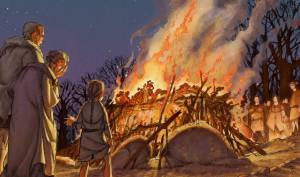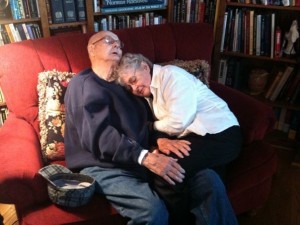I was asked a question about Catholics, cremation and the scattering of ash. Here is my brief answer:

-
Save
The whole issue of cremation goes back to the Romans. They denied the bodily resurrection so they often burned the body and if they were rich they put the ashes in urns and put them in the necropolis which was the city of the dead. Every year on the anniversary of the death they would “visit” the dead in remembrance and pour their favorite wine into the ashes.
Imagine the contrast in ancient times. The Romans would build a pyre and lay the body on top. The flames would take many hours to completely consume the body. The whole time the smell of burning hair and flesh would waft through the air. It was a big project and you watched the body disappear with nothing left but a heap of ashes and foul smells.
In contrast, the Christians prepared sarcophagi for their dead. Often it was decorated with biblical images related to the resurrection. Or the body was carefully wrapped in white to represent forgiveness of sins and eternal life. They were placed in the ground or the catacombs with respect for the integrity of the body which would one day be raised.
Christians forbid cremation because they wanted to stand in contrast to the pagans who cremated as a statement against the bodily resurrection. They also did not have an necropolis, the city of the dead. Rather, Christians had a cemetery which means a sleeping place.

-
Save
They did not bury the dead – they deposited them in the grave. Why deposit? Because just as you deposit money in the bank you intend to come back and withdraw the money. The body was deposited in the ground in preparation for Jesus coming back to withdraw the body at the end of time.
So cremation was a denial of the bodily resurrection and burial was an affirmation that the body was sleeping awaiting the day of, resurrection.
The Catholic Church has recently taught that cremation was OK as long as it was not a statement against the bodily resurrection. As long as one affirmed the resurrection of the body at the end of time, cremation was acceptable. However to preserve the integrity of the body the remains were to remain in one place and not scattered across an ocean or field, etc.
The Code of Canon Law says, “§3. The Church earnestly recommends that the pious custom of burying the bodies of the deceased be observed; nevertheless, the Church does not prohibit cremation unless it was chosen for reasons contrary to Christian doctrine.”
The Catechism states, “The Church permits cremation, provided that it does not demonstrate a denial of faith in the resurrection of the body.”
The scattering of the ashes could be seen as denying the bodily resurrection because scattering the ashes everywhere can imply the person is gone — reabsorbed into the physical creation as its final end. It ceases to exist.
That is why the Catholic Church affirms the need to keep the ashes with integrity remembering that those ashes in the urn are the very matter that will be raised up at the end of time and reconstituted into the body of the person. The new heavenly body will be reunited with the soul to live forever — either in glory or in the torments of hell separated from God for eternity.

-
Save
When my father died my mother had no desire to visit the grave (though she has several times since) because she said, “That is not Dad”. I explained to her that this attitude denied the bodily resurrection because God loves stuff. He made stuff, matter, the body. On the day he created Man he said, “It is very good.” He liked what he had created.
That cold dead body was still Dad and when Jesus comes back he loves that body enough to raise it from the dust and re-fashion it into a new heavenly body. God keeps his eye on those dry bones and dust every day. My mom now understands. Her’s was an understandable reaction to the body with the life gone.
At the end of time my Dad will be raised from the dead and his body will be glorified. If God loves the bodily remains inside the coffin or urn then how much more should we respect the integrity of the remains as well.
Catechism (CCC) 1004: In expectation of that day, the believer’s body and soul already participate in the dignity of belonging to Christ. This dignity entails the demand that he should treat with respect his own body, but also the body of every other person, especially the suffering: “The body [is meant] for the Lord, and the Lord for the body. And God raised the Lord and will also raise us up by his power. Do you not know that your bodies are members of Christ?… You are not your own; … So glorify God in your body” (1 Cor 6:13–15, 19–20).
CCC 997 What is “rising”? In death, the separation of the soul from the body, the human body decays and the soul goes to meet God, while awaiting its reunion with its glorified body. God, in his almighty power, will definitively grant incorruptible life to our bodies by reuniting them with our souls, through the power of Jesus’ Resurrection.


